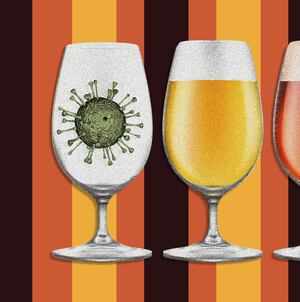The folks at Constellation Brands surely had a premonition that this was going to be a very tough year.
“Seriously?” they must have thought, “there’s a virus that’s become a deadly pandemic, and it’s got the same name as our bestselling beer Corona? You have got to be kidding.”
Unfortunately, this was no joke. Constellation is the sole U.S. importer of the Grupo Modelo beer brands, including the super-popular Corona Extra, along with brands like Modelo Especial, Pacifico and the new Corona Hard Seltzer. (Grupo Modelo was wholly acquired in 2012 by AB InBev, but export rights in the U.S. went to Constellation as part of an antitrust deal worked out by the Justice Department.)
The Corona/coronavirus thing was mostly a worry that never materialized. There were a small, small number of people who seemed to consider a connection between the beer and the pandemic for more than a few seconds, but mostly it was fodder for “man on the street” interviews at local TV stations. The company did feel compelled to issue a response on Feb. 28, about two weeks before the panic took hold in the U.S.
“Our thoughts and prayers go out to those affected by this terrible virus and we hope efforts to more fully contain it gain traction soon,” said Bill Newlands, president and chief executive officer at Constellation Brands. “It’s extremely unfortunate that recent misinformation about the impact of this virus on our business has been circulating in traditional and social media without further investigation or validation. These claims simply do not reflect our business performance and consumer sentiment, which includes feedback from our distributor and retailer partners across the country. We’ve seen no impact to our people, facilities or operations and our business continues to perform very well.”
Then came March, and suddenly there most definitely was an impact to their people, facilities and operations.
The story that seemed to get the most attention about Corona was that the people of Mexicali voted to not allow work to continue on a large Grupo Modelo brewery that was over half-finished. That’s still under negotiation, but the facility probably wasn’t going to come online in time to affect production this year anyway.
The real problem for Grupo Modelo, and Constellation, was that the Mexican government decided alcoholic beverage manufacture didn’t fall under “essential industrial activity,” unlike in America. That decision was initially reported in the U.S. trade press as a shutdown in Corona production, which may well have led to some panic buying at all levels of the beer supply chain, from wholesaler to retailer to the drinker walking out of the gas station with a case under each arm and a 12-pack balanced on their head.
Constellation assured their wholesalers that supply would be managed. But confidence may have been undercut by acknowledgment from Heineken USA that core packages of their Mexican brands Dos Equis, Tecate, and Sol would be in short supply. That seemed to override the updates from Constellation saying that their two breweries would not be shut down, but instead reduce output.
So, a reduced amount of beer continued to flow from the breweries to American shelves. Meanwhile, according to Maggie Bowman, senior director for communications at Constellation’s Beer Division, “demand did surge and remains high, which speaks to the strength of the brand family and its consumer base.”
Surging demand and reduced supply, though; that sounds like no beer. Running out of beer because people are buying it so fast is a good problem to have, but it’s definitely still a problem.
Yet, Corona is still out there in most places, thanks to precautionary measures taken by Constellation’s supply chain. Remember, while we all bought a lot more beer to enjoy in our locked-down homes, we essentially stopped buying pints in bars and restaurants and at sports venues. All that beer had to go somewhere, so Constellation put it in 12-packs and shunted it down the off-premise trunk of the chain.
“We took actions early on, ahead of the production slowdown,” said Bowman, “to build inventory and focus on producing core high-volume packages, so that consumers have access to their favorite Corona and Modelo products at retail. During the early days of COVID ‘pantry-loading,’ there was a surge in demand for larger pack sizes, as shoppers made fewer but larger trips, so we prioritized faster-moving SKUs in larger pack sizes.”
What does that mean? It’s a lot like the soda shortages some of us have noticed. My mother-in-law really likes a diet birch beer carried by our local Canada Dry bottler. With a limited workforce, and a shortage of cans, priorities change. Mom’s favorite is not a big seller, so they’ve only canned it once or twice in four months. I’m also having a hard time finding Coke Zero cans in my market; not as big a seller as Diet Coke, apparently, but the 20-ounce plastic bottles are available, so I’m adapting.
It’s been a time of variety trimming for Constellation, too. “We expect consumers are able to find Corona and Modelo at local retail,” says Bowman, “maybe in a different pack size than what they originally set out to purchase, but the research shows that consumers will switch pack sizes as long as they can find the brand(s) they desire.”
So, those little “Coronita” 7-ounce bottles? Sorry, buddy, they’re gone for now. You can ship a lot more beer in a flat of two 12-packs. Tallboy cans of Modelo? There’s no baseball, so less demand for the big cans; but hey, we’ve got six-pack bottles, how’s that? What’s going to be interesting to see is whether the wide variety of packages will return as the supply pipeline refills and the pandemic ends.
But that’s not all 2020 had in store for Constellation. The company decided to go ahead with their planned debut of Corona Hard Seltzer in March. Product launches have been particularly hard slogging in the pandemic: there’s no sampling in stores or bars, and a strong tendency for consumers to stick with trusted products.
Constellation got lucky here. Hard seltzer growth has stayed very strong throughout this year, and Corona’s brand recognition parlayed the launch into some real traction. “Corona Hard Seltzer is already the number four hard seltzer brand,” Bowman said, noting sales that put it at an almost six-percent share of the hard seltzer market.
It’s been a rough year, and it’s not over, but Corona has met corona, and so far, the beer is still standing.






